From Tiptree to Leckie to L’Engle and Cherryh, science fiction has a rich history of women writing progressive and popular fiction. One could argue that modern science fiction was vitalized by Shelley, and Ursula K. Le Guin has been an ambassador for fantastic and thoughtful fiction for decades. And, of course, now they’re the destroying it one novel at a time.
Recently, the /r/printSF sub-Reddit began a conversation about the best science fiction by women. I realized that I’ve read a woefully small number of the listed books, and this spurred some thought in my head about continuing this conversation, and using it as an opportunity to highlight some of the best science fiction books by women.
My own experiences within science fiction are fairly shallow (at least in terms of the scope of this project), so I asked some of my favourite authors and writers to tell me a bit about their favourites. So, join me, Julie Czerneda, Ann Leckie, Francis Knight, Andrew Liptak, Teresa Frohock, and Maureen Kincaid Speller as we gush about some of the best novels that science fiction has on offer.
C.J. Cherryh
The most popular answer by far? C.J. Cherryh. Ann Leckie appreciates Cherryh’s approach to science fiction through the angle of linguistics and anthropology, rather than the more traditional sciences of physics and biology, and Julie Czerneda calls Cherryh’s work “consistently amazing.”
“My favourite SF by a woman?” asked Julie Czerneda, the Phillip K. Dick nominated author of The Clan Chronicles. “C.J. Cherryh’s Foreigner series, hands down. Foreigner’s protagonist is a civil servant/linguist/librarian named Bren whose competence and integrity turn him into the pivot point between two species: his own, uninvited Human settlers on the planet Atevi, and the Atevi, who barely tolerate their presence on their world. These are novels of first contact, as Bren’s understanding of the Atevi grows, and novels of space travel and how that affects us over time, as others return to Atevi. What pleases me most about this series is that the Atevi, however we come to understand and care about them, are not us, will never be us, and yet Cherryh manages, through Bren, to forge a credible and ever-evolving partnership. She also shows us the development of a space industry within a society different from our own, and its repercussions, which are hauntingly familiar. Very highly recommended. I gobble up the entire series with delight each time the next new title is released, and never fail to find some new twist or small detail to enjoy.”
After fighting past the challenge of narrowing her list down to one favourite, critical darling Ann Leckie, author of Ancillary Justice, came to the same conclusion as Czerneda. “So, it’s actually kind of difficult to narrow it down–my favorite SF book or series by a woman?” she pondered. “The answer has changed at various times during my life, too. Most recently I suppose I’d have to say C.J. Cherryh’s Foreigner series. It’s not “hard” SF–or, that is to say, it’s not particularly interested in physics or even biology–but rather more linguistic and anthropological. Its also one of those books where, if you don’t find the central character appealing you might as well put the book down and find something else. If you do, well, likely you’ll be more or less happy to read three hundred pages of him drinking tea.”
Francis Knight, author of the Rojan Dizon series, was also on the Cherryh hypetrain, but her choice was a bit aslant of Leckie and Czerneda. “Two of my all time favourites from long ago when I read much SF — Pride of Chanur and Merchanter’s Luck — are both by CJ Cherryh,” she told me. “I love the depth of her characters, and how the worlds are allowed to unfold in front of us rather through the interaction of the characters with their setting. In Pride of Chanur, too, she shows us the workings of an alien mind (she does this is several of her SF books) which I find fascinating.”
Buy Foreigner by C.J. Cherryh
I love the depth of her characters, and how the worlds are allowed to unfold in front of us rather through the interaction of the characters with their setting.
The Coldfire Trilogy
My own choice here was easy: C.S. Friedman’s Coldfire trilogy, starting with Black Sun Rising. I can hear your argument from here. “But, it’s fantasy!” Sure. On the surface, the trilogy shares a lot in common with traditional epic fantasy: quest structure, gothic world, vampires, magic, interdimensional demons. It’s all there. But, I think what makes Friedman’s work stand out so starkly against other fantasies is its science fiction roots, which hide under the surface of every element in whole trilogy.
At its heart, Friedman’s trilogy is about humanity adapting itself to best survive in a hostile environment. This occurs in broad strokes, as Friedman builds a world and cultures scraping by on an alien world, and a more personal level, as the (anti-)heroes struggle through the brutal fae-wracked lands between them and their goals. On an even tighter level, Gerald Tarrant, one of science fiction’s most fascinating characters, fights against the human roots planted deeply within him, and the wild magics he has harnessed against the fae magics. Friedman complicates this by casting a fading humanity into a situation where they cannot rely on the technology that has guided their civilization for millennia, but must return to their roots and examine their past failures. Science fiction is often about humanity’s intersect with technology, but the Coldfire trilogy is about humanity removed from technology. And it’s fascinating.
Buy Black Sun Rising by C.S. Friedman
Andre Norton
As with all readers, early exposure to amazing books helped set Leckie on her path towards winning the Hugo and the Nebula for Ancillary Justice. She put in a good word for an under appreciated childhood-favourite: Andre Norton. “I also, though, want to put in a word for the favorite of my youth–which would have been a tie between The Zero Stone and Sargasso of Space, both by Andre Norton. Norton has received a fair amount of acclaim–she had a World Fantasy lifetime achievement award, she was a SFWA Grandmaster, she’s in the Science Fiction Hall of Fame. But I kind of feel like her name doesn’t come up in lists of big name, influential writers nearly as often as it should.
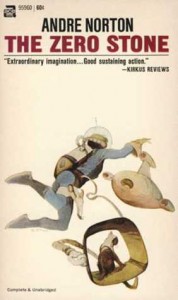
Pat Murphy & Kathleen Ann Goonan
“Putting aside Ursula Le Guin,” said Maureen Kincaid Speller, reviewer for Strange Horizons, “who showed so many of us that it is possible to produce readable, humane science fiction, and Karen Joy Fowler, who is one of my favourite sf writers, the list contained a couple of, to me, significant omissions: Pat Murphy and Kathleen Ann Goonan. Pat Murphy’s incomparable The City, Not Long After, with its vision of a post-apocalyptic San Francisco which has become a haven for artists. Now, they are confronted by Four Star, a former army general who is determined to impose order in the usual way, and recreate the glory that was the United States. Obviously, they will fight him with art it’s a witty but also deeply serious novel, which seems to me to celebrate the opportunities that have arisen post-apocalypse.
“Kathleen Ann Goonan’s Nanotech Quartet, beginning with Queen City Jazz, presents a USA transformed by nano- and biotechnology, and jazz. Like The City, Not Long After, it seems to me to be able to find joy and beauty in among the uncertainty of catastrophic transformation.”
Buy The City, Not Long After by Pat Murphy
Karin Lowachee
Andrew Liptak, freelance writer for Kirkus Reviews and Tor.com, was quick to gush about a writer he recently had an opportunity to work with on his first anthology, War Stories. “If there’s any author that I think is criminally under-read / under-bought and under-known, it’s Karin Lowachee,” he said. “I first met Karin’s works when a friend of mine pushed a copy of her debut novel, Warchild, in my hands, insisting that I read it. I did, and over that summer, we traded the remainder of her trilogy (Burndive and Cagebird) between us. In the following years, she vanished, only to reappear in 2010 with a new novel, Gaslight Dogs. Her stories taught me that fiction can be a broad canvas, and that minor characters in one novel can have lives of their own in others. Her works are powerful character dramas, from her characters in her novels, to those in her short stories. When I began to edit War Stories, she was one of the first authors who came to mind, and I was thrilled to accept her story, Enemy States into the book”
Buy Warchild by Karin Lowachee
Up Against It by M.J. Locke
“Up Against It by M. J. Locke,” Teresa Frohock, author of Miserere was quick to respond. “I’m not going to give you the blurb, but I can tell you all the things that I loved about this novel. The writing is engaging and the pacing is excellent. I love a good political mystery and Locke delivers on all fronts with Up Against It. It’s a tight novel that wasn’t stingy with either the science or the fiction, and the most important aspect to me, the characters, were all believable and intriguing. I also loved the fact that Jane Navio is a mature woman, who knows how to make tough decisions and navigate treacherous situations with her brains and not a gun. It’s the best science fiction that I’ve read in a long time.”
Buy Up Against It by M.J. Locke
“Are women destroying science fiction?” asked K. Tempest Bradford of NPR. “Yes. Women created it, so it’s only fair. […] In destroying it, women are creating a larger space for themselves within science fiction; one filled with their voices, dreams, experiences and realities.”
C.J. Cherryh remains a popular choice, and continues to publish exciting science fiction and inspire new writers, and writers like M.J. Locke and Karin Lowachee proved that diversity, thoughtfulness, and undistilled fun still exist in the genre. It’s interesting to note that only Karin Lowachee, Julie E. Czerneda, and Kathleen Ann Goonan publish under names that aren’t gender-non-specific or initials. Is this a coincidence stemming from a small sample size? Or a larger trend? In a genre as rich with wonderful women as science fiction, we can dream of a day when the name on the cover can be ‘Celia’ or ‘Carolyn’ or ‘Alice’ without reserve. Are we getting closer to that day?
What are some of your favourite science fiction novels written by women?
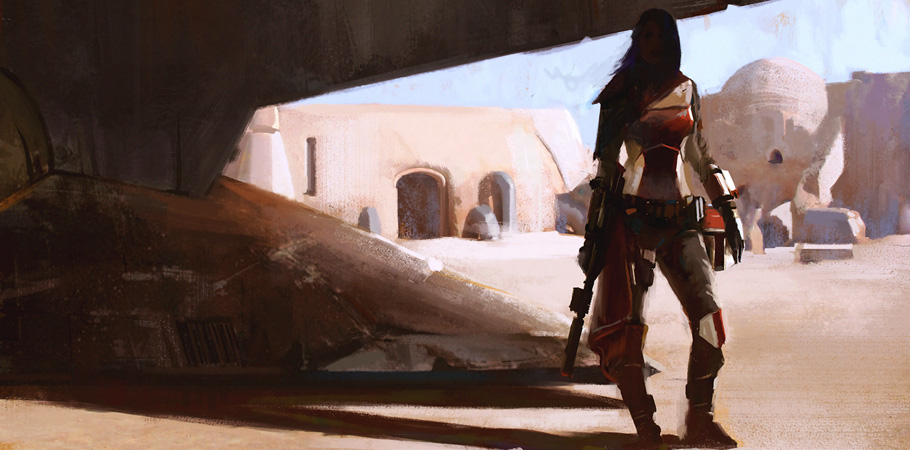
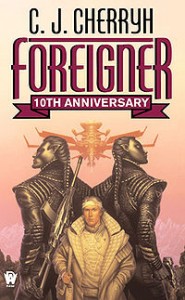
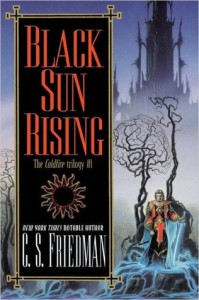
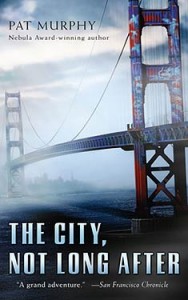
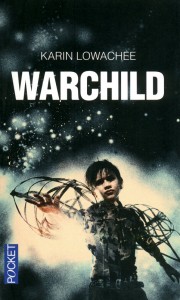
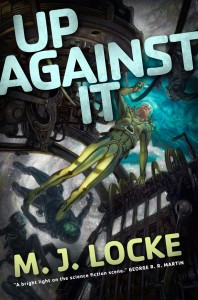

Big fan of Cherryh. I haven’t read her Foreigner books, but I’ve hit a good half dozen or more of her Alliance / Union novels.
My recs:
Molly Gloss: The Dazzle of the Day
Nicola Griffith: Ammonite and Slow River
Mary Doria Russell: The Sparrow
Karen Traviss: City of Pearl (Wess’har Wars)
L Timmel Duchamp: Alanya to Alanya (Marq’ssan Cycle)
Elizabeth Bear: Dust or Hammered
Otherwise, consider Kristine Smith (Code of Conduct) and Kristine Kathryn Rusch (The Disappeared or Diving into the Wreck)
Lois McMaster Bujold’s Vorkosigon series is absolutely first rate. Elizabeth Bear is also a great choice, perhaps more fantasy than SF but definitely a strong writer.
Plenty!
Lots of the oeuvre of Lois M, Bujold. She’s built an amazingly deep space opera universe over the Vorkosigan Saga
Linda Nagata is self publishing Near future milSF these days, but she started with hard, space science fiction 20 years ago and it still holds up.
Octavia Butler!
I’m also a fan of Eleanor Arnason, whose written both SF and fantasy, and doesn’t get the credit she deserves. (c.f. Ring of Swords and other Hwradrath stories and novels)
Lois M. Bujold is great, and Connie Willis’s time traveling historian books are some of my favorite books ever.
David: Bear’s Jenny Casey trilogy and Dust trilogy are very much SF.
CJ Cherryh is my own favorite too. I’ve read 12 of her Foreigner books in the last year or so, and they’re excellent. Almost all her other SF (Faded Sun, Chanur, Alliance/Union/Merchanter Universe just to name a few) is great. There aren’t many authors I love more.
(I actually came here to recommend Linda Nagata, only to find out Paul beat me to it :) Her older Nanotech books and the more recent The Red are both excellent. )
Eek! Sorry to nitpick, but–you spelled Julie Czerneda’s name wrong.
Also, Cherryh is probably my favorite all-time author. All across her work are truly alien minds–whether they belong to beings that look like humans, beings that look absolutely dissimilar to humans, or are humans themselves. I’d argue that this is central to the Merchanter-Alliance universe work: all these diverse groups of people: the merchanters, the Earth company fleet, the Union, even different groups of people still together inside the Solar System, all of them have mindsets that are in some ways alien to the others.
I’d highly recommend her earlier work to people who are mostly familiar with the Foreigner series. Cherryh’s the kind of author that can approach this same problem again and again and never come in at exactly the same angle twice.
Also, random thought: I continue to believe that Cyteen would make an amazing opera. I get shivers down my spine when I imagine scenes with Ari I and Ari II singing with and against each other.
Indeed I did. Thanks for pointing that out, Katherine.
Nina Allan is amazing – read ‘The Race’ or ‘Stardust’. Also EJ Swift is pretty good -check out ‘Osiris’ and ‘Cataveiro’
Bit odd to mention Andre Norton and not mention the Andre Norton Award (https://en.wikipedia.org/wiki/Andre_Norton_Award), named after her and given by SFWA for YA scifi/fantasy books.
Yay. Love for Friedman and Cherryh!
I haven’t revisited Julian May’s Saga of the Pliocene Exile in a while, but it was formative.
Also, I’m discovering Octavia Butler, and both Dawn and Parable of the Sower are fantastic.
No mention of SF Mistressworks? Which by the end of the year will have published 285 reviews of 230 books by 112 women sf writers. http://sfmistressworks.wordpress.com/
It’s really past time that Lois McMaster Bujold was given her due as a serious master of Sci-Fi, and I’m apparently not the only person who thinks so.
http://www.amazon.com/Lois-McMaster-Bujold-Critical-Explorations/dp/0786468335
In an odd way I think the amazingly fun and exciting universe and characters she writes about have distracted a lot of people and it doesn’t occur to them that there is a lot more under the surface of her writing, and she is often dismissed as writing space opera with no discussion of what else is in those books (and believe me there is a lot in those books).
It’s possible for space opera to grapple with serious issues. Not every serious look at the effects of technology on society needs to be in the form of a dystopia. New tech could have benefits as well as drawbacks and still manage to not result in destroying all of society.
She is a master at looking at how technology interacts with and redefines social issues and has explored how future technology might affect topics such as women’s reproductive rights, rape, disability, economics, and bioengineering. She focuses on what’s most important when imagining future tech: the human element and the effect it has on individual lives. And she is far more subtle about it than other writers.
My favorite science fiction by a woman would be almost anything by Octavia Butler. I think her last book “Fledgling” is under-rated and I truly love her “Clay’s Ark” series. Lots of telepathy and freaky alien sex. What’s not to like? :)
I also loved the great Ursula K. LeGuin books (The Dispossessed, The Left Hand of Darkness and the Earthsea trilogy) but when I tried to re-read them they didn’t hold up.
I love the CS Friedman “Coldfire” series–it was one of the first trilogies I bought instead if borrowed.
This year I read Mary Kress’ “Probability” trilogy, which is good if not great sci-fi.
I didn’t know CJ CHERRYH was female. Doh! I’ve seen the name but not read any of the books. I’ll check out “Foreigner” Soon… I’m always looking for good space opera in the vein of Hamilton/Reynolds/Morgan. What is Rachel Bach like?
I have tried to get into Bujold’s “Miles Vorkosigian” series but for some reason when I start with the early books they just seems dated and uncompelling to me so I have never finished reading one of her books. I know she’s one many many Hugos and the Hugo/Nebula double for the same book (Paladin of Souls) but that’s the kind of fantasy which doesn’t work for me.
Lois Bujold, Anne McCaffrey and Julian May were formative favourites. I also recommend Kim Westwood’s excellent near-future The Courier’s New Bicycle and Marianne de Pierres’ amazing Sentients of Orion series.
Karen Lowachee really, really deserves more attention than she’s gotten so far, so thank you for pointing her out!
Her Warchild books (Warchild, Burndive, Cagebird)- three of a conceived several more, if I understand it correctly – are disturbingly good and disturbingly…. disturbing.
She is one of the very few Science Fiction writers I have come across who realistically considers the psychological effects of many space-operatic tropes – space wars, aliens, pirates, ever-present media and more. Especially disturbing, because other than the science fiction setting, her depictions are very realistic, is that she focuses on children and young adults caught up in these things. I’ve actually used ‘Cagebird’ in a psychology class to start a conversation about child soldiers…
long story short – go out and read! More to the point, buy her books so she can write more…
Julie Czerneda and C J Cherryh are absolutely two of my favorite writers, ever. But please add Melissa Scott to the long list of wonderful female science fiction writers. She has not written anything (that I’m aware) in years, but “Trouble and Her Friends”, “Nightsky Mine”, “Burning Bright” and “Dreamships”, as well many others of her stories are wonderful, haunting views of the future. Let’s add C L Moore to the list, too!
Lois really does deserve more attention and credit than she gets. Not only does she write fantastic science fiction, but her books are exemplary when it comes to including a diverse cast of characters. I reviewed her book about Miles Vorkosigan’s mother, ‘Cordelia’s Honor’, over at The Shandy Media Club as part of a drive to highlight diverse books for the #weneeddiversebooks campaign on Twitter. You can read the review here: http://projectshandy.co.uk/smc-cordelias-honor-weneeddiversebooks/
Cannot believe no one has mentioned Joan Slonczewski. “Brain Plague” is my favorite, but all of her books are fascinating and thought provoking. You also missed Sheri Tepper – again, anything she writes is worth the purchase price. Love Czerneda, and Friedman (except Coldfire – too fantasy, not enough science for my tastes). Connie Willis: I own everything she’s written. She’s won more Hugo’s than any other writer, male or female. Concur with recommendations for Pat Murphy, Andre Norton (Forerunner Foray, Judgment on Janus, Witchworld). Anne McCaffrey – “Dragonflight” series (but anything written with/by her son I can’t stomach).
Ugh. Please change “can” to “can’t” in my last sentence!!
Sheri Tepper writes amazing SF, in addition to the many greats mentioned above. I’m partial to Sideshow, because Anthropology, but anything she’s written is worth reading.
I don’t think anyone has mentioned Sheri Tepper yet. Sideshow is one of my favorites, perhaps because I’m an anthropologist, but I like everything of hers that I’ve read.
Marge Piercy’s woman on the edge of time and he, she, and it are fantastic. also ursula leguin’s the dispossessed and the lathe of heaven
I’m a huge fan of Connie Willis, whose short stories and novels combine humor and satire with the serious effects that technology can have on how people live their lives. Doomsday Book is one of the most memorable books I’ve ever read.
r/printsf is really a very, very small subreddit (only 18k subs) which is a backwater by comparison to something like r/books , which has over 3.5 million subscribers. I think if you asked that same question in r/books, you would get a far different and far more comprehensive sampling of what redditors actually think.
I’m more interested in what my readers have to think than the readers of /r/books, Chas. Thus, this post. :)
Oh dear I am embarassed I forgot to mention Connie Willis. Her DOOMSDAY BOOK is one of my favorite books of all time and her other books “To Say Nothing Of the Dog” and “Black-Out/All Clear” are both brilliant as well. I have her collection of short stories sitting on my nightstand (along with a whole bunch of other books, to be clear) but I still feel bad she didn’t pop into my mind immediately.
I haven’t read any of her other stuff but I presume the quality is still there..does she do non time-travel stories?
P.s. I have a copy of CJ Cherryh’s FOREIGNER now. :)
@Mad Professah — I bought a copy of Foreigner yesterday, too!
I also tried to locate a copy of The Winter Queen, but my used bookstore of choice didn’t have a copy, and there’s no Kindle edition available! Boo-urns.
[…] Let’s Talk about Science Fiction Books by Women – Another good list, this time focusing on sf by female authors. […]
I’d love to hear what people say is the best CJ CHERRYH to start with? I couldn’t get into “Foreigner” at all. :(
Mary Gentle … love love love Mary Gentle. Her Orthe books are pure sci-fi, but even her Alt. History novels have sci-fi elements. I’d love her for her anti-Tolkein novel Grunts! alone; a book that still makes me laugh out loud at it’s truly evil humour.
Glad someone mentioned C.L. Moore. Leigh Brackett was a solid writer, too.
Ooh, didn’t see this post, so I’m late to the party. My 2015 reading project is to correct some of the gender imbalance in my reading habits and read all or mostly women writers for the year. This post will be quite helpful.
@Matt W — I made the same commitment last year and enjoyed myself immensely. It also led me into several of my favourite novels I’ve read this year (Ancillary Sword, The Goblin Emperor, etc.), which is even more gratifying! Enjoy. :)
I’m a huge fan of Kage Baker’s The Company series. Funny, serious, and fascinating time-travel books.
Also Jane Lindskold is great at writing stand-alone books (a lost art). Although mostly Fantasy there are a few Sci-Fi ones e.g. Smoke and Mirrors (but Child of a Rainless Year is the semi-fantasy book that stood out to me the most).